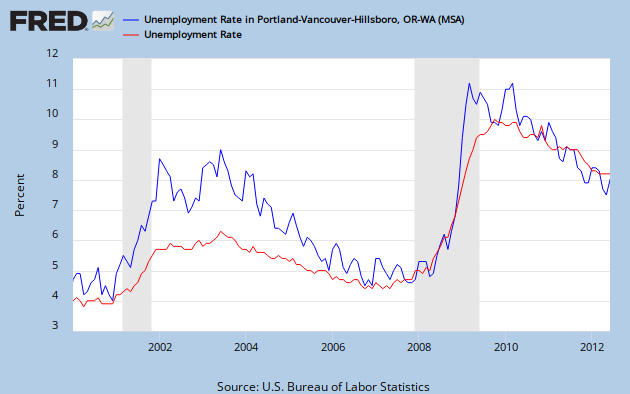
Image courtesy of IMDB
Matty Yglesias is an interesting and provocative economics and politics writer who pens the “Moneybox” column for Slate Magazine. He recently visited Portland, courtesy of 1000 Friends of Oregon and the Bus Project to talk about his new book.
I’ve read a lot of Yglesias’s stuff and generally like it, but the product of his visit to Portland was unfortunate. In his piece, “How Portland Got It’s Groove Back,” Yglesias claimed that: “Metro Portland, once a basket case, is now doing fine.” He notes that Portland suffered unemployment “nearly 50% higher than the national average” during the 2003 recession, but that during the most recent turndown, Portland unemployment
fell harder but also bounced back faster. And over the past year, Portland’s unemployment rate has fallen to below the national average…National unemployment is still about two percentage points higher today than at its post-dot-com peak in 2003, while Portland’s unemployment is one point lower.
Yglesias attributed Portland’s relative success (if it can be called that!) to the politics that attracted the young and restless to the city, the policies satirized in Portlandia. Perhaps we’re not the place where young people go to retire after all?
So what’s the problem?
The problem is that Yglesias relies almost exclusively on a comparison of Portland’s unemployment rate with the national unemployment rate, shown in the graphic below:

Strike one: his conclusions rely solely on the trend line in 2012–that little squiggle where Portland’s rate is below the national rate. If you look just a few years back, things don’t look so great, do they?
Strike two: why do we look only at unemployment as our only measure of economic vitality? I’ll leave that one up to the economists.
But strike three is the worst one. If, as Yglesias claims, the economic engines of Portland are its urban appeal to young people, it’s “bicycles, food carts, and artisanal what not” then what is the appropriate comparison? It’s not the United States, it’s other hip urban areas, like Austin TX, Seattle WA, Salt Lake City UT, and the one mentioned in Yglesias’s article, Washington DC.
How do we look stacked up against these competitors (sorry for the fuzziness–the St. Louis Fed site was not allowing me to save the graph)? The answer is: pretty crappy. ALL of these urban areas have experienced an uptick in the last year. But, unlike Portland, these areas aren’t just near the national unemployment rate, they are well below it, and Portland’s unemployment continues to lag them by 25-33%.
If this is getting our groove back, it feels like we’re still playing LPs while our true economic competitors are using digital music.

Thoughts on Matty Yglesias’s thoughts on Portlandia
Image courtesy of IMDB
Matty Yglesias is an interesting and provocative economics and politics writer who pens the “Moneybox” column for Slate Magazine. He recently visited Portland, courtesy of 1000 Friends of Oregon and the Bus Project to talk about his new book.
I’ve read a lot of Yglesias’s stuff and generally like it, but the product of his visit to Portland was unfortunate. In his piece, “How Portland Got It’s Groove Back,” Yglesias claimed that: “Metro Portland, once a basket case, is now doing fine.” He notes that Portland suffered unemployment “nearly 50% higher than the national average” during the 2003 recession, but that during the most recent turndown, Portland unemployment
Yglesias attributed Portland’s relative success (if it can be called that!) to the politics that attracted the young and restless to the city, the policies satirized in Portlandia. Perhaps we’re not the place where young people go to retire after all?
So what’s the problem?
The problem is that Yglesias relies almost exclusively on a comparison of Portland’s unemployment rate with the national unemployment rate, shown in the graphic below:
Strike one: his conclusions rely solely on the trend line in 2012–that little squiggle where Portland’s rate is below the national rate. If you look just a few years back, things don’t look so great, do they?
Strike two: why do we look only at unemployment as our only measure of economic vitality? I’ll leave that one up to the economists.
But strike three is the worst one. If, as Yglesias claims, the economic engines of Portland are its urban appeal to young people, it’s “bicycles, food carts, and artisanal what not” then what is the appropriate comparison? It’s not the United States, it’s other hip urban areas, like Austin TX, Seattle WA, Salt Lake City UT, and the one mentioned in Yglesias’s article, Washington DC.
How do we look stacked up against these competitors (sorry for the fuzziness–the St. Louis Fed site was not allowing me to save the graph)? The answer is: pretty crappy. ALL of these urban areas have experienced an uptick in the last year. But, unlike Portland, these areas aren’t just near the national unemployment rate, they are well below it, and Portland’s unemployment continues to lag them by 25-33%.
If this is getting our groove back, it feels like we’re still playing LPs while our true economic competitors are using digital music.